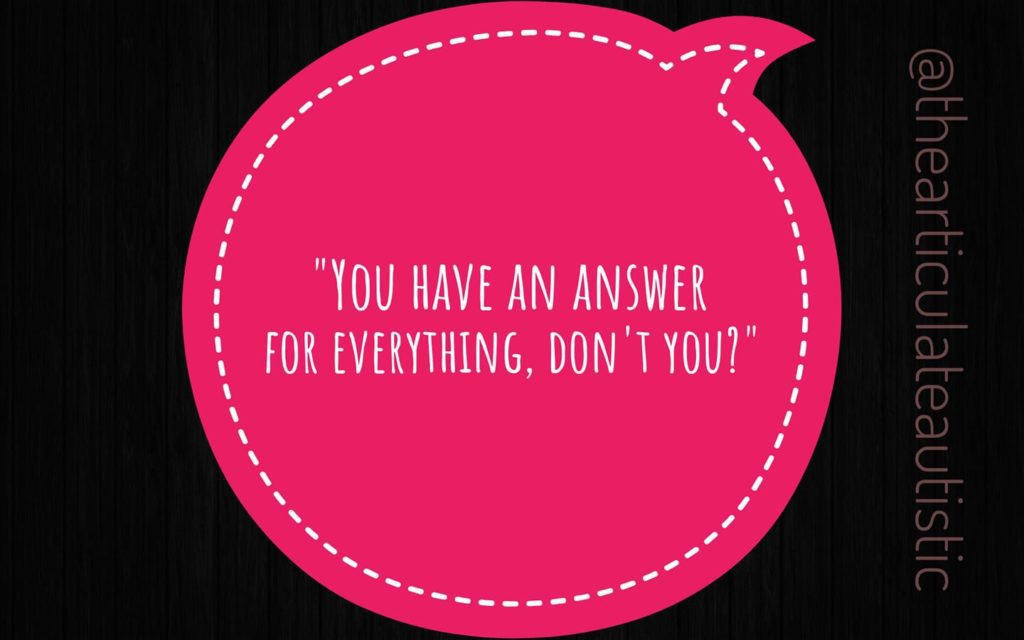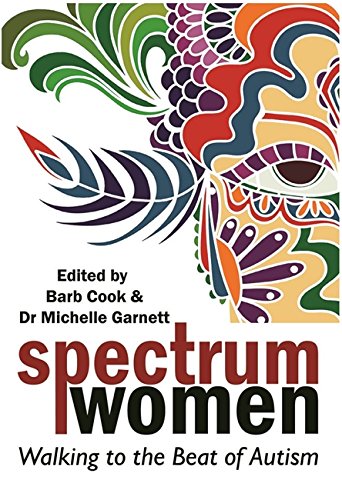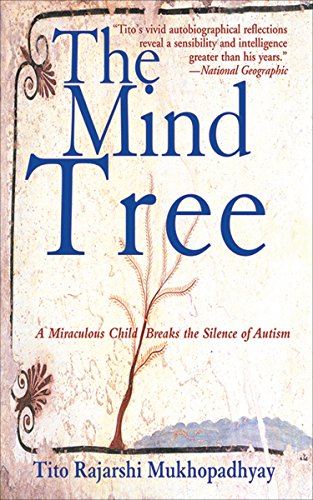“You Have an Answer for Everything, Don’t You?”

This sentence, although I probably haven’t heard it in over 15 years, strikes fear into my heart. Ice-cold, icicle-in-the-gut terror.
We’ve been talking about being specific with autistic people, understanding that “why” is just a question to us, nothing more, and our inability to conceptualize social hierarchy.
This post is an offshoot of that. When the situation is reversed, and a neurotypical person is asking an autistic person questions, they are not always looking for clarification.
Sometimes, they are already very irritated with the autistic person, and they are about to explode, but, instead of explaining this, they start asking questions INTENDED TO TRIP UP THEIR TARGET.
When the autistic person answers these questions literally, because they take them at face value, the person talking to them gets even MORE frustrated and ends up lashing out with, “You have an answer for everything, don’t you?”
This isn’t a question, it’s an attack, and it’s quite abusive.
(Article continues below.)
The best way to improve communication with your autistic loved one is to understand how your autistic loved one’s mind works! Intentions, motivations, and personal expressions (facial expressions or lack thereof, body language, etc.), are often quite different in autistic people than they are in neurotypical people.
Experience a better understanding of your autistic loved one by reading books about life from an autistic perspective as well as stories that feature autistic characters. You’ll have so many “Ah ha!” moments and start seeing your autistic loved one in a different light (and you’ll have a better understanding of their behaviors, which you may have been misinterpreting up until now).
Books I recommend for a better understanding of your autistic loved one:
But the autistic person is utterly baffled by this response because, literally, yes, they DID have an answer to all of the questions put to them!
Usually when somebody asks questions in an abusive manner, it’s because they are hoping the questions will prove they were right and the other person is wrong. That’s what they are looking for. Not answers, but a concession that their target was wrong and they were right.
This is where the social hierarchy part comes in: If the autistic person were to concede by deferring to the authority figure, the outcome would usually be more favorable for them because the person doing it would “save face”, and, therefore would be less likely to be abusive.
Confused yet? I understand. It still confuses me, too.
The thing is, it doesn’t matter what your neurology, if you say this to another person, it’s abusive, it’s cruel, and it’s unnecessary.
If you really weren’t aware of the dynamics and thought someone was screwing with you, which is why you said it, OK. Fine. But, you know better now.
Autistic people are literal. Everything said to us or asked of us is taken at face value. We can learn sarcasm, innuendo, and inference, but those things do not come naturally to us.
– Jaime A. Heidel
So, for younger autistics and those who have not been able to learn the ins and outs of neurotypical communication, hearing this “question” can be incredibly damaging emotionally.
It’s like we’ve just put in a round room and told to pick out the corner! To us, it’s gaslighting (intentional but subtle verbal abuse designed to make someone think they are losing their mind), and we don’t know how to respond because any response will be the wrong one, and we’re terrified!
Also, if you’ve ever said this to an autistic person in the heat of anger, and they’ve run off crying, it’s NOT because you’ve succeeded in calling them out, and now they are ashamed, they HAVE NO CLUE what just happened, and that is as terrifying and disorienting for us as hearing a bomb go off next door would be for you.
Follow me on Instagram.
Want downloadable, PDF-format copies of these blog posts to print and use with your loved ones or small class? Click here to become a Patreon supporter!










«JobBerry» представляет собой уникальный маркетплейс вакансий по всей России. Здесь каждый желающий найдет для себя работу по специальности и ту, где получится реализовать свой творческий потенциал, лидерские качества и способности. На сайте https://jobberry.ru (москва работа вахтой без посредников ) несколько сотен вакансий от самых крупных, надежных работодателей, готовых предложить лучшие условие труда, высокую зарплату, а деньги выплачиваются дважды в месяц или каждую неделю. Портал предлагает ознакомиться и с предложениями поработать вахтовым методом. Это возможность не только получить высокий заработок. Многие работодатели предоставляют бесплатное жилье и горячее питание. Среди преимуществ сайта выделяют:
– регулярное обновление вакансий;
– большой выбор рабочих специальностей, предложений для работы вахтовым методом;
– установлена высокая заработная плата;
– возможность добавить вакансию в избранное, чтобы потом к ней вернуться;
– только честные компании, которые давно на рынке.
На сайте можно не только найти подходящую работу, но и опубликовать свое предложение о поиске сотрудника. Вы сможете просматривать вакансии в наиболее комфортном формате, делиться впечатлениями о сотрудничестве с работодателем, чтобы другие смогли быстрее сориентироваться и принять решение о сотрудничестве.
Не менее важное достоинство портала заключается в возможности просматривать фото, видеоотчеты. Если заинтересовались определенной вакансией, то свяжитесь с работодателем, чтобы узнать о ней побольше. Для того чтобы выложить свое предложение, необходимо воспользоваться кнопкой «Добавить вакансию». Для поиска работы воспользуйтесь фильтром, который отыщет должность в сфере пищевого производства, строительства. Заходите сюда ежедневно, чтобы найти работу мечты.
Thank you for this. Someone just said it to me and I didn’t understand why. I also didn’t understand why having a correct answer for everything was a problem. I’m not sure I do understand actually. What I do understand is that it hurt me a great deal. That he was looking at me with disdain when he said it. Your deeming of it as abusive makes me feel less confused …less crazy 🙁 …thank you